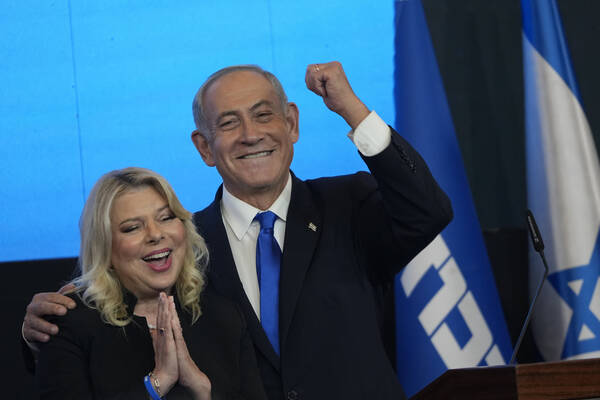Newsletter
Nov
8
2022
Welcome to the Tuesday News Bulletin! Jewish Currents is constantly getting quotes and scooplets from our network of sources, and every Tuesday, we release small stories exclusive to our newsletter subscribers in emails like this one. In addition to original reporting, the Tuesday News Bulletin serves as a forum for aggregating stories Jewish Currents staffers are tracking, with plenty of links to other publications so you can keep up with everything happening on our beats.
If you have more stories or tips, you can reach Alex Kane at alex@jewishcurrents.org.

November 8th, 2022
In last Tuesday’s Knesset elections, the Israeli electorate delivered a big win to Benjamin Netanyahu and his right-wing coalition in the fifth Israeli election since 2019. The right-wing bloc won 64 Knesset seats, which will likely give Netanayhu and allied parties enough votes to form a stable and ideologically coherent coalition government. Meanwhile, the Labor Party, which dominated Israeli politics for the country’s first three decades of existence, only received four Knesset seats, while the Meretz party, with only 3.14% of the total Israeli vote, fell below the 3.25% threshold to obtain any Knesset seats. Labor and Meretz’s poor showing, in addition to the Palestinian nationalist party Balad failing to hit the threshold, meant that despite receiving about half of the total votes, the anti-Netanyahu bloc wasn’t able to block Netanyahu’s victory, let alone appoint another prime minister.
Netanyahu’s probable return to power is thanks to the strength of the Religious Zionism coalition, consisting of three of the most extreme parties in Israeli politics. The coalition’s 14 seats (the most it has ever gotten), together with Likud’s 32 seats and the 18 seats won by the religious parties Shas and United Torah Judaism, make up the 64 Knesset seats of the right-wing bloc. Religious Zionism’s top two lawmakers are Bezalel Smotrich, who has expressed extreme views such as support for segregating Palestinians and Jews in Israeli maternity wards, and Itamar Ben-Gvir, a follower of far-right ideologue Meir Kahane who wants to expel so-called “disloyal” Palestinian citizens of Israel and give soldiers an even freer hand to kill Palestinians with impunity. In exchange for joining Netanyahu’s coalition government, both Smotrich and Ben-Gvir will likely be made heads of Israeli ministries. Smotrich reportedly wants to head the Treasury or Defense ministries, while Ben-Gvir wants to run the Public Security ministry, which oversees Israel’s law enforcement agencies, including the police.
On the latest episode of On the Nose, Jewish Currents senior reporter Alex Kane spoke to editor-at-large Peter Beinart, contributing editor Joshua Leifer, and contributing writer Elisheva Goldberg about the rise of the Religious Zionism coalition, the commonalities between that coalition and the Israeli center-left, and how these elections might affect the US-Israel relationship. Listen to the podcast here, or find it wherever you get your podcasts.

Israeli forces demolish a Palestinian residential building in Al-Baqaa, southern West Bank, as part of the ongoing ethnic cleansing campaign in Masafer Yatta, October 31st. Another house was demolished the same morning in the nearby village of Um Lasafa. Photo: Basil Adra/Activestills.
Basil Adra/Activestills.
As part of the Tuesday News Bulletin, Jewish Currents is publishing a photograph taken by members of Activestills every week, archiving ongoing dispossession and resistance from the river to the sea. You can find more information on this collaboration here.
- Ben-Gvir’s likely impending appointment as a minister in Netanyahu’s cabinet prompted Biden administration representatives to indicate that they might not meet with the extremist lawmaker, according to a report in Axios. The report stated that the White House is concerned about Ben-Gvir’s racist rhetoric targeting Palestinians: Responding to the Israeli elections, State Department spokesperson Ned Price said the US-Israel alliance is based on “shared interests” and “shared values,” and that the US hopes “all Israeli Government officials will continue to share the values of an open, democratic society, including tolerance and respect for all in civil society, particularly for minority groups.”
- Israeli troops killed six Palestinians in the last week throughout the occupied West Bank. On November 2nd, Israeli soldiers killed 54-year-old Habis Abdel Hafeez Rayan for allegedly attempting to run them over. On November 3rd, Israeli troops killed four Palestinians. 14-year-old Mohammad Samer Mohammad Khaluf was shot in Nablus, while 28-year-old Farouq Hasan Salame, reportedly a member of military group Islamic Jihad with ties to Nablus-based armed group the Lions’ Den, was shot during an Israeli military raid in Jenin. 42-year-old Daoud Mahmoud Khalil Rayyan was killed amidst confrontations between Palestinians and Israeli troops raiding Beit Duqqu, a Palestinian village near Jerusalem. The fourth Palestinian killed that day was 20-year-old Amer Husam Halabiya, who was shot dead after stabbing an Israeli police officer. On Saturday, Israeli forces killed 18-year-old Mosaab Mohammad Nafal. The army told Haaretz that Palestinians in Nafal’s Ramallah-area town were throwing stones at Israeli vehicles, prompting the confrontation that led to Nafal’s death. The early November killings come after a particularly deadly October for Palestinians in the West Bank: Israeli forces killed 29 Palestinians last month, making it the deadliest month in what has already become the deadliest year for Palestinians in the West Bank since 2015. The sharp rise in Israeli killings of Palestinians is largely the result of an increase in raids on Palestinian cities and villages around the West Bank, where the army seeks to confront Palestinian fighters who have carried out attacks against Israeli soldiers and civilians.
- Addressing the UN General Assembly last week, E Tendayi Achiume, the UN special rapporteur on contemporary forms of racism, said countries shouldn’t adopt the International Holocaust Remembrance Alliance’s definition of antisemitism. Achiume said use of the definition has “an impact on the human rights of minorities and vulnerable groups, including Jews,” and called it “controversial” and “divisive.” In a response to Achiume, the US State Department said using the definition is “integral to the fight to eliminate” antisemitism and said Achiume “misrepresented” IHRA. The definition has been adopted by 37 countries, and Israel advocacy organizations frequently ask institutions to adopt the definition as a way to identify and combat antisemitism. But IHRA is controversial because its definition of antisemitism includes speech critical of Israel, such as the phrase “the existence of a State of Israel is a racist endeavor.” In a statement published on Thursday, 128 scholars asked that the United Nations not adopt IHRA—as Israeli UN envoy Gilad Erdan has requested—and said that IHRA is “a politicized definition that is instrumentalized to deter free speech and to shield the Israeli government from accountability for its actions.”
- New Jersey Representative Josh Gottheimer asked the Department of Education to launch an investigation into the University of Berkeley for potential civil rights violations after student groups on campus adopted bylaws over the summer pledging not to invite speakers who support Zionism. Gottheimer wants the department to investigate whether “federal taxpayer dollars are used to discriminate against Jewish and pro-Israel students at UC Berkeley.” Supporters of the bylaws say that student groups have the right to adopt bylaws in line with their political commitments, and see the bylaws as similar to a policy against inviting white supremacist speakers. The bylaws, which prohibit invitations to speakers who support Zionism, do not place restrictions on the views of students who join the clubs or attend their events. Israel advocacy groups routinely file complaints with the Department of Education seeking to trigger federal investigations into schools’ compliance with Title VI. If the department finds that a school discriminated against protected minority groups, it could lead to loss of federal funding: Thus far, no school has ever had their funding cut-off because of a complaint filed by an Israel advocacy group.
- On November 1st, nearly 500 artists and individuals sent a letter to Secretary of State Antony Blinken asking him to intervene in the case of Bilal Al-Saadi, the chairperson of the Jenin Freedom Theatre arrested by Israeli soldiers in September. The Jenin Freedom Theatre, located in the Jenin refugee camp in the occupied West Bank, has become famous for using the arts as a form of “cultural resistance” against the Israeli occupation. The letter denounces the arrest of theatre head Al-Saadi as a “an assault on Palestinian civil society and cultural life.” Al-Saadi was placed in “administrative detention,” a frequently-used form of imprisonment that locks Palestinians up without charge or trial. Responding to his detention in September, free speech group PEN America said “the arrest and imprisonment without trial of Bilal Al-Saadi represents a serious violation of his human rights, while the growing crackdown on Palestian civil society raises grave concerns about Palestinians’ rights to free expression and artistic freedom.”